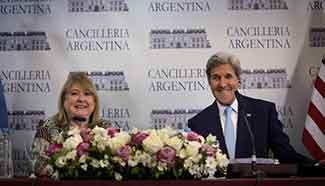LONDON, Aug. 5 (Xinhua) -- Britain's lowest ever interest rate of just a quarter of one percent was given a mixed reception Friday as commentators and markets digested the decision by the Bank of England.
The bank's monetary policy committee (MPC) has cut the rate from 0.50 percent to 0.25 percent, the lowest since the bank opened in 1694. The move is a response to the fall-out from Britain's decision in June to leave the European Union.
Mark Carney, governor of the Bank of England, warned the interest rate, a previous low of 0.50 percent since 2009, could fall even lower by the end of this year.
The bank is also to restart quantitative easing, effectively printing money to buy bonds to help boost the economy. It announced a 132 billion U.S. dollars scheme to force banks to pass on the low interest rate to households and businesses and the purchase of 80 billion U.S. dollar worth of British government bonds and 13 billion U.S. dollars of corporate bonds.
The Times newspaper Friday described the post-Brexit measures announced by Carney as "dramatic emergency action to prop up the economy."
The Daily Telegraph reported that lenders are failing to pass on the rate-cut to borrowers, saying Britain's biggest lenders are at odds with the Bank of England by delaying mortgage rate reductions despite Carney telling them they now had "no excuse" not to put them into effect.
Savers and thousands of pensioners who rely on interest from savings to top up their incomes and state pensions will be badly hit, said some investment organisations.
Chancellor of the Exchequer Philip Hammond said later that the Brexit decision was a new chapter for Britain, but the country was well placed to deal with the volatility caused by the referendum decision.
Under the headline, "Treating the Hangover", the London-based Economist magazine commented Friday that the Bank of England had not changed base rates in seven years, but when it finally moved, it did so with a bang.
It said the measures were in response to the low growth the MPC expects in the wake of Brexit, and as well as the cut in the rate to 0.25 percent, the bank has expanded its quantitative easing scheme and introduced a new funding scheme for banks.
It said a bold new program of public investment spending might do more to shore up both business confidence and demand than central-bank bond-buying.
"Were this a typical recession, Britain's best hope might be a rise in exports to the continent. The interest-rate cut should keep the downward pressure on sterling, and the European recovery continues to plod along. Yet European firms will be reluctant to spend more money in Britain until the future of its relationship with the EU is clearer," it said.
Labour's Shadow Chancellor John McDonnell commented: "It's time for the Chancellor to step up and shoulder his share of responsibility for economic stability. Britain is on hold waiting for Philip Hammond to tell us whether he will stick to his predecessor's planned cuts to investment. The more the Chancellor dithers, the greater the potential cost to the British economy."
"Labour would inject 500 billion pounds (657 billion U.S. dollars) into the economy, directly and through national and regional development banks, to rebuild and transform our economy," McDonnell said.











